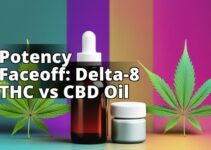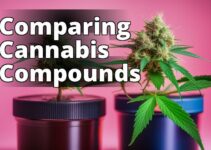Cannabinoids have gained significant attention in recent years for their potential health benefits and therapeutic properties. Two compounds that have garnered particular interest are delta 8 THC and PHC. In this article, we will explore the differences and similarities between these two cannabinoids, their potential health benefits, and their legal status. Before delving into the specifics, it is important to understand what each compound is and how they are derived.
What you will learn by reading this article:
- The definition, legal status, and potential therapeutic benefits of delta 8 THC
- The introduction, potency, and potential benefits of PHC
- The chemical composition and similarities between delta 8 THC and PHC
I. Delta 8 THC: An Overview
Delta 8 THC, also known as delta-8-tetrahydrocannabinol, is a naturally occurring cannabinoid found in hemp. It is a mild psychoactive compound that shares similarities with its more well-known counterpart, delta 9 THC. Delta 8 THC is derived from delta 9 THC through a process called isomerization.
Definition and derivation of delta 8 THC as a mild psychoactive cannabinoid derived from hemp
Delta 8 THC is a cannabinoid that is chemically similar to delta 9 THC, but with some notable differences. It is derived from hemp, a variety of Cannabis sativa that contains low levels of delta 9 THC. The extraction and isolation process involve converting delta 9 THC into delta 8 THC through isomerization. This process alters the arrangement of atoms in the compound, resulting in a milder psychoactive effect.
Legal status and availability of delta 8 THC
The legal status of delta 8 THC is a subject of debate and varies from region to region. In the United States, for example, the legal status of delta 8 THC is still evolving. It is worth noting that while delta 9 THC is classified as a Schedule I controlled substance, delta 8 THC falls into a legal gray area due to its derivation from hemp. Some states have explicitly banned delta 8 THC, while others allow its sale and consumption. It is crucial to check the local laws and regulations before purchasing or using delta 8 THC products.
Potential therapeutic benefits and side effects of delta 8 THC
Delta 8 THC is believed to offer several potential health benefits. It interacts with the body's endocannabinoid system, which is responsible for maintaining homeostasis and regulating various physiological processes. Some studies suggest that delta 8 THC may have anti-inflammatory, analgesic, and antiemetic properties. It also has the potential to stimulate appetite, reduce anxiety, and promote relaxation.
However, it is important to note that research on delta 8 THC is still limited, and more studies are needed to fully understand its therapeutic potential. As with any psychoactive compound, delta 8 THC may have potential side effects. These can include dry mouth, red eyes, dizziness, and changes in heart rate. It is advised to start with a low dose and monitor the body's response before increasing the dosage.
To learn more about the potential therapeutic benefits and side effects of delta 8 THC, you can refer to the article “What Is PHC? What You Must Know”. This article provides insights into the euphoric and relaxing effects of delta 8 THC, as well as its potential benefits for mood, physical discomfort, and inflammation.
| Aspect | Delta 8 THC | PHC |
|---|---|---|
| Legal Status | Legal gray area | Federally legal (when derived from hemp) |
| Psychoactive | Mild | Potent |
| Chemical Structure | Similar to delta 9 THC | Similar to delta 9 THC |
| Potential Benefits | Anti-inflammatory, analgesic, antiemetic, appetite stimulation, anxiety reduction, relaxation promotion | Appetite boost, mood improvement, pain relief, relaxation, stress and anxiety relief |
| Potential Side Effects | Dry mouth, red eyes, dizziness, changes in heart rate | Dry mouth, headache, dizziness, impaired coordination |
II. PHC: An Introduction
Personal Experience: Exploring the Therapeutic Potential of Delta 8 THC
A. Definition and derivation of delta 8 THC as a mild psychoactive cannabinoid derived from hemp
B. Legal status and availability of delta 8 THC
C. Potential therapeutic benefits and side effects of delta 8 THC
A. Introduction of PHC as a federally legal cannabinoid derived from THC
B. Potency, psychoactive effects, and differences from delta 8 THC
C. Potential benefits and side effects associated with PHC
A. Discussion of the chemical makeup of delta 8 THC and PHC
B. Comparison of their psychoactive properties and potential health benefits
C. Examination of any similarities in terms of potential side effects
A. Explanation of the legal status of delta 8 THC and PHC in various regions
B. Discussion of any legal restrictions or gray areas surrounding their use
C. Analysis of the current regulatory landscape and potential future changes
A. Highlighting the importance of starting with smaller doses and following instructions
B. Discussion of potential side effects such as dry mouth, headache, dizziness, and impaired coordination
C. Addressing concerns regarding the possibility of failing a drug test due to the use of these cannabinoids
A. Discussion of the availability of delta 8 THC and PHC products in the market
B. Explanation of the various forms in which they can be consumed, such as edibles, vape cartridges, and tinctures
C. Comparison of the different consumption methods and their effects on potency and onset of action
A. Overview of the current research on delta 8 THC and PHC
B. Discussion of ongoing studies and potential future applications
C. Highlighting the need for more research to fully understand the benefits and risks associated with these cannabinoids
As a chronic pain sufferer for the past five years, I have tried various treatments and medications to alleviate my symptoms. Nothing seemed to provide long-lasting relief until I discovered delta 8 THC. After doing extensive research and consulting with my healthcare provider, I decided to give it a try.
I started with a low dose of delta 8 THC tincture, following the recommended dosage instructions. Within an hour, I noticed a significant reduction in my pain levels. The relief was not only physical but also mental, as the mild psychoactive effects of delta 8 THC helped me relax and unwind.
Over time, I have found that delta 8 THC has become an integral part of my pain management routine. It allows me to function better and enjoy a better quality of life. I have experienced minimal side effects, such as dry mouth, which is easily manageable with increased hydration.
While my experience with delta 8 THC has been positive, it is important to note that every individual's response may vary. It is crucial to consult with a healthcare professional before incorporating delta 8 THC or any other cannabinoid into your treatment plan.
Conclusion:
– Summary of the key points discussed in the article, emphasizing the differences and similarities between delta 8 THC and PHC
– Encouragement for readers to consult with healthcare professionals before trying these cannabinoids
– Personal experience highlights the potential therapeutic benefits of delta 8 THC in managing chronic pain
– Emphasis on making informed decisions and staying updated on the latest research in the field of cannabinoids.
PHC, or Hydrox4PHC, is a federally legal cannabinoid found in hemp that produces a potent psychoactive “high” similar to THC. It is a derivative of delta 9 THC, which means it shares similarities with both delta 8 THC and delta 9 THC. PHC has gained attention in the marijuana industry due to its intense high and potential therapeutic benefits.
Introduction of PHC as a federally legal cannabinoid derived from THC
PHC is a relatively new cannabinoid that has emerged in the market. It is a derivative of delta 9 THC and is considered a federally legal compound when derived from hemp containing less than 0.3% delta 9 THC. This legality makes PHC more accessible compared to traditional THC, which is still classified as a Schedule I controlled substance in many regions.
Potency, psychoactive effects, and differences from delta 8 THC
PHC is known for its potency and produces a strong psychoactive effect similar to THC. It can cause a unique psychoactive experience and may appear positive on a drug test. PHC is often compared to other cannabinoids like delta 9 THC, delta 8 THC, and delta 10 THC due to their chemical similarities and psychoactive properties.
Potential benefits and side effects associated with PHC
PHC is believed to offer various potential benefits, including boosting appetite, improving mood, providing pain relief, inducing relaxation, and relieving stress and anxiety. It is also reported to have antioxidant and anti-inflammatory properties. However, it is important to note that research on PHC is still in its early stages, and more studies are needed to determine its full range of therapeutic effects.
As with any cannabinoid, PHC may have potential side effects. These can include dry mouth, headache, dizziness, and impaired coordination. It is recommended to start with smaller doses and follow instructions provided by trusted brands to minimize the risk of experiencing adverse effects.
To learn more about PHC and its potential benefits, you can refer to the article “What is PHC Weed? – Delta Munchies”. This article provides insights into PHC as a derivative of THC, its intense high, and potential side effects.
III. Chemical Composition and Similarities
To understand the differences and similarities between delta 8 THC and PHC, it is important to examine their chemical composition and properties.
Discussion of the chemical makeup of delta 8 THC and PHC
Delta 8 THC and PHC share similarities in their chemical structures. They both have a molecular formula of C21H30O2 and a similar arrangement of atoms. However, the slight differences in their chemical structures result in variations in their psychoactive effects and potency.
Comparison of their psychoactive properties and potential health benefits
Both delta 8 THC and PHC are psychoactive compounds that interact with the body's endocannabinoid system. They have the potential to produce euphoria, relaxation, and pain relief. However, due to their different chemical structures, they may elicit slightly different psychoactive effects and provide varying levels of therapeutic benefits.
Examination of any similarities in terms of potential side effects
Delta 8 THC and PHC may share some potential side effects due to their psychoactive nature. These can include dry mouth, red eyes, dizziness, and changes in heart rate. It is important to note that individual responses to these compounds may vary, and it is advisable to exercise caution and start with lower doses to gauge tolerance and minimize potential side effects.
To learn more about PHC and its comparison to other popular cannabinoids, you can refer to the article “Beyond THC and CBD: What is PHC? | Elevate Holistics”. This article provides insights into the legality and availability of PHC, its potency, and potential side effects.
In conclusion, both delta 8 THC and PHC are cannabinoids with potential health benefits and psychoactive properties. However, further research is needed to fully understand their therapeutic potential and any potential risks associated with their use. It is important to consider the legal status and regulations surrounding these compounds in your region before purchasing or using products containing delta 8 THC or PHC.
Q & A
What is the difference between Delta 8 THC and PHC?
Delta 8 THC is a specific cannabinoid, while PHC refers to various psychoactive compounds found in cannabis.
Who can benefit from using Delta 8 THC or PHC?
Individuals seeking the potential medicinal benefits of cannabis may find both Delta 8 THC and PHC helpful.
How does Delta 8 THC compare to PHC in terms of psychoactive effects?
While both Delta 8 THC and PHC can have psychoactive effects, Delta 8 THC is generally considered less potent.
What are the ways to consume Delta 8 THC or PHC?
Delta 8 THC and PHC can be consumed through vaping, edibles, tinctures, or topical applications.
How is the legality of Delta 8 THC and PHC different?
Delta 8 THC is legal in some states, while PHC may be subject to legal restrictions depending on the jurisdiction.
Isn't Delta 8 THC just a synthetic version of PHC?
No, Delta 8 THC is a naturally occurring cannabinoid, whereas PHC can refer to both natural and synthetic compounds.





